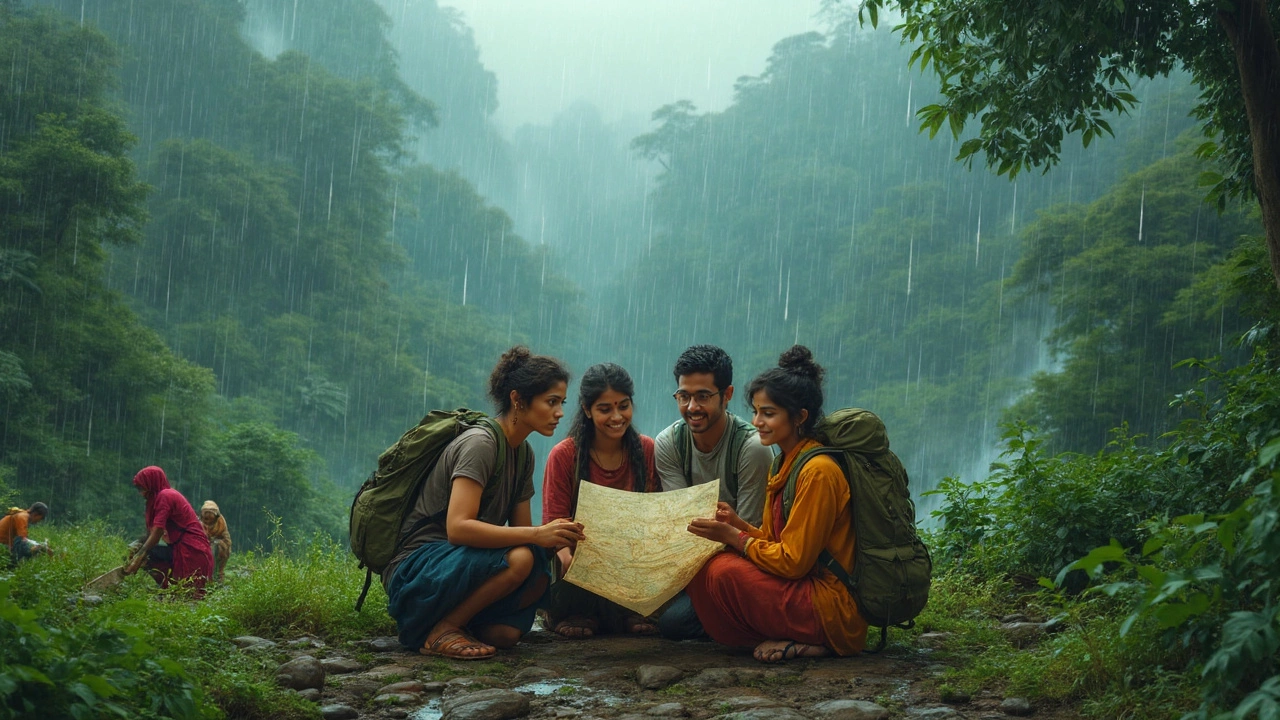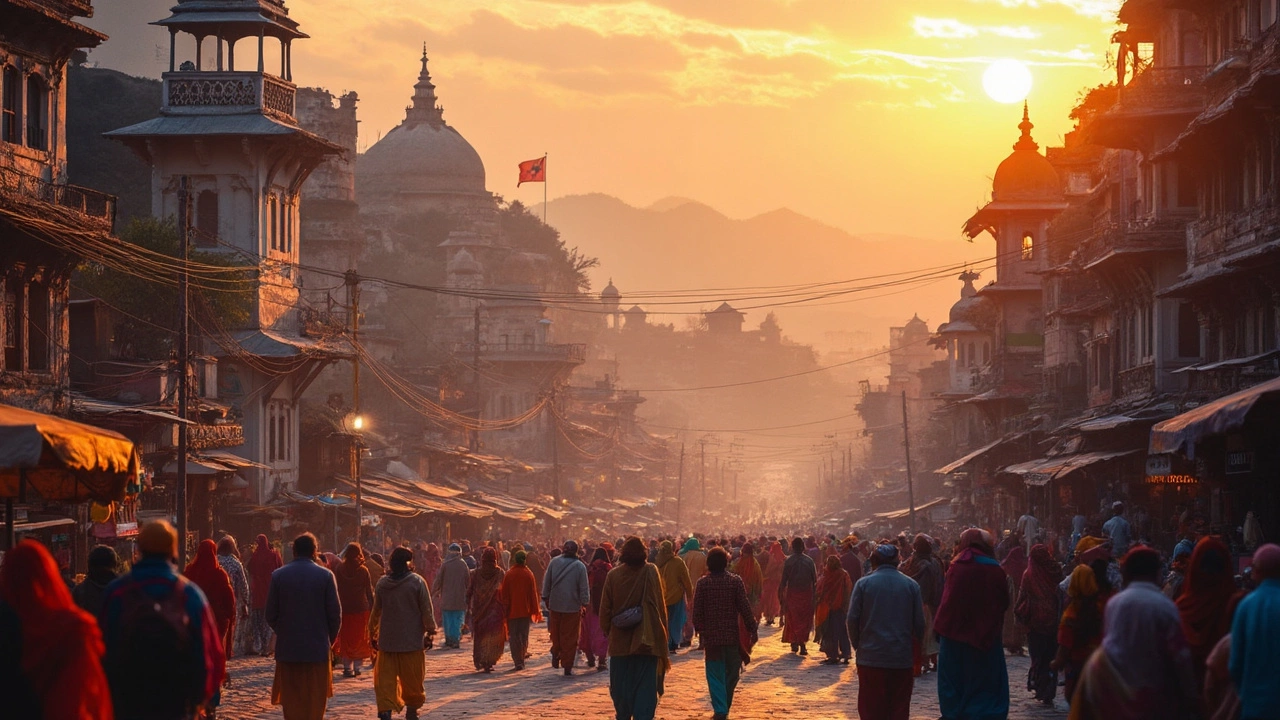Traveling to North India can be an exhilarating experience, full of vibrant cultures and breathtaking landscapes. But before you pack your bags, let's talk safety. Is it safe for US citizens to explore this part of India? Knowing the ins and outs can turn a potential challenge into a worry-free adventure.
First things first, the safety dynamics vary across North India, from bustling cities to serene mountains. While major tourist spots like Delhi and Jaipur are generally safe, staying vigilant, especially in crowded areas, is key. Think common sense: guard your belongings and be wary of overly friendly strangers.
Curious about cultural norms? A little knowledge goes a long way. For instance, dressing modestly and being respectful of local customs not only enhances your experience but also keeps potential faux pas at bay.
- Understanding Safety in North India
- Cultural Norms and Etiquette
- Health and Food Safety
- Practical Travel Tips
Understanding Safety in North India
When you're gearing up for a trip to North India, safety is likely at the top of your mind. From the bustling streets of Delhi to the serene landscapes of Himachal Pradesh, knowing where to tread cautiously is crucial for a smooth journey. Let's walk through some key points to help you stay safe.
City Safety
Urban areas like Delhi, Agra, and Jaipur are usually on every traveler's list because of their rich history and iconic landmarks. While crime rates are relatively low for tourists, petty crimes like pickpocketing do happen, especially in crowded markets like Chandni Chowk in Delhi or Bapu Bazaar in Jaipur. A good practice is to keep your belongings secure and stay in well-lit areas at night.
According to the U.S. State Department, "India generally has been considered safe for tourists, especially those who are prepared and act with awareness."
Knowing the Regions
North India is vast, and conditions can vary widely. While the tourist hubs are bustling and lively, rural areas such as parts of Rajasthan can be quite different. It's essential to have a trusty guidebook or app that can offer advice specific to the area you plan to visit.
Transport Tips
Getting around is part of the adventure, but it's important to travel smart. Whether you're taking a rickshaw, a train, or booking a cab, confirm official identification and fare before hopping in. For longer journeys across regions, trains are often the safest and cheapest. And don't forget travel insurance—it can be a lifesaver in unforeseen situations.
Health and Hygiene
Staying healthy is part of staying safe. North India's cuisine is a delight, but it's important to stick to bottled water and freshly-cooked food. Before traveling, check for any required vaccinations.
| Region | Peak Tourist Season | Safety Level |
|---|---|---|
| Delhi | October to March | Moderate |
| Jaipur | November to February | Moderate |
| Agra | October to March | High |
With these tips in mind, you're set to have a memorable and safe journey exploring the unique culture and history that North India has to offer.
Cultural Norms and Etiquette
Diving into the cultural norms of North India is an adventure on its own. Respecting these norms not only enriches your travel experience but also ensures a smoother journey. Let's break down the essentials.
Dress Code and Conduct
In North India, dressing modestly is a sign of respect. For women, covering shoulders and knees is advisable, especially when visiting temples or rural areas. Men are usually fine with short-sleeve shirts and trousers. It helps to carry a scarf or a shawl, just in case.
Interacting with Locals
Indians are known for their hospitality and friendliness. A simple Namaste with folded hands can open doors to warm interactions. But remember, public displays of affection are generally frowned upon, so keep things modest.
"Understanding cultural differences is key to a fulfilling trip in India," says travel expert Rajesh Singh. "When in doubt, observe how locals behave and follow suit."
Dining Etiquette
Eating with the right hand is customary, as the left hand is considered unclean. If you're offered food or drink, it's polite to accept, as refusing may be seen as an insult. When you're at a local's home, leaving a bit of food on your plate indicates you’re full and satisfied.
Religious Sensibilities
North India is packed with sacred places, and respecting religious practices is crucial. When entering a temple, remove your shoes. Don’t forget to switch off your phone and maintain silence.
Understanding these cultural nuances can make your stay much more pleasant. Staying informed isn't just about being safe, but enhancing your India travel experience.

Health and Food Safety
Health is a big concern when traveling, especially in a place as diverse as North India. You're probably wondering what precautions to take, right? Let's break it down.
Vaccinations and Health Precautions
Before setting foot in India, make sure you're up-to-date with routine vaccinations like measles, mumps, and rubella. Also, consider getting vaccines for hepatitis A, hepatitis B, and typhoid. Consult with your healthcare provider for any additional vaccines based on current travel advisories.
Carry a basic medical kit. Round up essentials like pain relievers, anti-diarrhea medication, and any personal prescriptions. It’s not about being dramatic; it's about being prepared.
Food Safety
Now, let's talk about food. Indian cuisine is deliciously tempting, but stomach problems can follow if you're not careful. A simple rule of thumb? If it’s not cooked or peeled, better to skip it.
- Eat at reputable places. Street food can be risky, so choose stalls with high turnover rates, ensuring fresh food.
- Stay away from tap water. This includes ice and any food that might have been washed in tap water. Opt for bottled water and verify the seal before purchase.
- Savor cooked dishes. Foods that are thoroughly cooked are generally safe to eat.
Staying Healthy While Traveling
Walking a lot, catching early trains, so don’t skip meals. Eating regularly and staying hydrated helps you keep up with your itinerary.
Consider the weather too. North India's climate can be intense, ranging from chilly winters in the mountains to sweltering summers. Pack clothes accordingly and stay hydrated!
| Food Safety Tip | Benefit |
|---|---|
| Drink bottled water only | Reduces risk of waterborne diseases by 80% |
| Eat at places with good reviews | Ensures food quality and hygiene |
Practical Travel Tips
Alright, diving into practical travel tips for heading to North India. Let's keep it simple and to the point. Safety is about being prepared and knowing what to expect.
Getting Around
Public transport is budget-friendly but can be crowded. Taxis and rideshares like Ola are available in major cities. Always confirm the fare beforehand if using a local taxi. For a more immersive experience, try the trains; they're affordable and offer a unique window into local life.
Timing Your Trip
The best time to explore North India? October to March. The weather is cooler and pleasant, perfect for sightseeing and avoiding the stifling summer heat.
Where to Stay
Accommodation ranges from budget hostels to luxury hotels. In cities, staying in well-reviewed areas is smart. Popular spots like Connaught Place in Delhi have lots of choices that suit different budgets and come with plenty of traveler-friendly amenities.
Money Matters
Cash is still king in many parts, but cards are accepted in most urban settings. Ensure you have some Indian Rupees for local markets and smaller vendors. ATMs are widespread, but do check if your card works internationally to avoid hiccups.
Staying Connected
SIM cards are cheap and easy to get; Airtel or Vodafone are reliable options. Wi-Fi in hotels is generally decent, and internet cafes are sprinkled throughout urban areas.
Health Tips
Stay hydrated but stick to bottled water. Trying street food can be fun, but start with cooked foods at busy stalls to ensure freshness. Tourism departments advise carrying basic meds for common travel ailments, just in case.
| Tip | Details |
|---|---|
| Best Travel Time | October to March |
| Local Currency | Indian Rupee (INR) |
| Emergency Number | 112 for all services |
North India is an amazing destination that blends culture, history, and adventure. With these practical tips, you can focus on enjoying yourself and soaking up the rich experiences around every corner.
